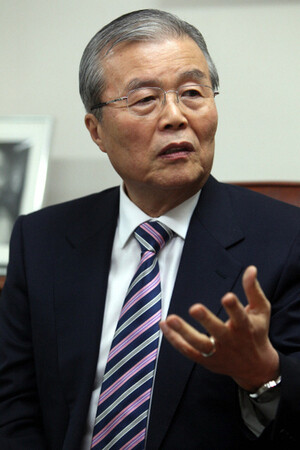hankyoreh
Links to other country sites 다른 나라 사이트 링크
Pres. Park’s election aide apologizes for loss of economic democratization

The former co-chairman of Park Geun-hye’s 2012 presidential election committee said on Oct. 20 that he “does not expect the administration to talk about economic democratization anymore.”
Former lawmaker Kim Jong-in, one of the main figures behind the successful campaign in 2012, went on to say he was “very sorry to the public for sending the message that [economic democratization] could happen.”
Kim’s remarks came from an interview with the political news website Pressian posted on Oct. 20.
“I absolutely believed in [Park’s] commitment [to economic democratization] during the election campaign, but you can’t ever look inside a person and see what’s going on,” Kim was quoted as saying.
“I may have gotten too greedy at some point,” he continued. “I decided never to advise anyone ever again.”
Kim joined Park‘s emergency committee in Dec. 2011 in the hopes of pursuing the economic democratization agenda. As co-chairman of the election committee and chairman of the “citizens’ happiness committee” for the ruling Saenuri Party (NFP), he helped usher Park to election in 2012.
But economic democratization vanished from the administration’s priorities soon after it took office the following February; in late 2013, Kim finally left the Saenuri Party.
“Economic democratization was her number one pledge during the election campaign, but after all that I talked at the time like it was going to happen, now it’s pretty much evaporated,” he told the Hankyoreh in a telephone interview.
“I feel very sorry to the public for failing to honor my responsibilities,” he added.
The Pressian interview also includes sharp criticisms of the administration’s economic policies.
“[Deputy Minister of Strategy and Finance] Choi Kyung-hwan keeps talking about how South Korea isn’t going to tread the same path as Japan’s ‘lost two decades,’ but we’re doing exactly what Japan did,” Kim said.
“When the exchange rate increased and the export companies’ profits dropped after the Plaza Accord in 1985, Japan lowered the interest rate to help them out, and that ended up ushering in speculation,” he explained. “Everyone got carried away with the rising real estate and stock values.”
“In the end, the Japanese economy didn’t survive - it just ended up with a lot of debt to China,” he added.
Kim recommended efforts to boost the competitiveness of major South Korean industries like shipbuilding, heavy industry, petrochemicals, steel, and construction.
“Do you really think we can expect that we can boost the economy just by lowering interest rates?” he said.
He went on to criticize the administration‘s approach to taxation.
“During the election campaign, [Park] pledged to expand social services. When she came into office, she should have been thinking about reworking the tax system, and the National Assembly should have been reforming the tax system during its regular session this year,” Kim said. “That’s all water under the bridge now.”
“As far as raising taxes to pay for expanded social services goes, that’s already out of the question,” he added.
Kim’s interview follows one given on Oct. 8 by another former emergency committee member and member of the team behind Park‘s election victory, Chung-Ang University emeritus professor Lee Sang-don. Speaking with the website OhmyNews about his role in Park’s victory, Lee was scathing about the administration, which he said had “no chance of succeeding.”
“I feel a deep sense of responsibility, and I am very sorry,” Lee said at the time.
With Kim’s interview, the two biggest names among the “new blood” brought on for Park’s 2012 campaign have both apologized to the public.
By Hwang Joon-bum, staff reporter
Please direct questions or comments to [english@hani.co.kr]

Editorial・opinion
![[Column] Has Korea, too, crossed the Rubicon on China? [Column] Has Korea, too, crossed the Rubicon on China?](https://flexible.img.hani.co.kr/flexible/normal/500/300/imgdb/original/2024/0419/9317135153409185.jpg) [Column] Has Korea, too, crossed the Rubicon on China?
[Column] Has Korea, too, crossed the Rubicon on China?![[Correspondent’s column] In Japan’s alliance with US, echoes of its past alliances with UK [Correspondent’s column] In Japan’s alliance with US, echoes of its past alliances with UK](https://flexible.img.hani.co.kr/flexible/normal/500/300/imgdb/original/2024/0419/2317135166563519.jpg) [Correspondent’s column] In Japan’s alliance with US, echoes of its past alliances with UK
[Correspondent’s column] In Japan’s alliance with US, echoes of its past alliances with UK- [Editorial] Does Yoon think the Korean public is wrong?
- [Editorial] As it bolsters its alliance with US, Japan must be accountable for past
- [Guest essay] Amending the Constitution is Yoon’s key to leaving office in public’s good graces
- [Editorial] 10 years on, lessons of Sewol tragedy must never be forgotten
- [Column] A death blow to Korea’s prosecutor politics
- [Correspondent’s column] The US and the end of Japanese pacifism
- [Guest essay] How Korea turned its trainee doctors into monsters
- [Guest essay] As someone who helped forge Seoul-Moscow ties, their status today troubles me
Most viewed articles
- 1[Column] The clock is ticking for Korea’s first lady
- 2Hong Se-hwa, voice for tolerance whose memoir of exile touched a chord, dies at 76
- 3After 2 months of delayed, denied medical care, Koreans worry worst may be yet to come
- 4[Column] Has Korea, too, crossed the Rubicon on China?
- 5[Correspondent’s column] In Japan’s alliance with US, echoes of its past alliances with UK
- 6US overtakes China as Korea’s top export market, prompting trade sanction jitters
- 7Samsung barricades office as unionized workers strike for better conditions
- 8All eyes on Xiaomi after it pulls off EV that Apple couldn’t
- 9More South Koreans, particularly the young, are leaving their religions
- 10John Linton, descendant of US missionaries and naturalized Korean citizen, to lead PPP’s reform effo